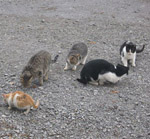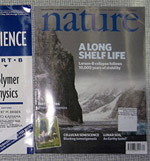The effects of climate change on coastal ecosystems: interview with Chris Craft
 Chris Craft. Professor at Indiana University and past president of the Society of Wetland Scientists. Image credit, Indiana University.Wetland scientists around the globe have been greatly concerned with climate change’s effect on coastal ecosystems. Coastal and estuarine wetlands are in dire risk due to sea-level rise and saltwater intrusion, and with wetlands’ extensive ecosystem benefits, the world cannot afford to loose these precious systems.
Chris Craft. Professor at Indiana University and past president of the Society of Wetland Scientists. Image credit, Indiana University.Wetland scientists around the globe have been greatly concerned with climate change’s effect on coastal ecosystems. Coastal and estuarine wetlands are in dire risk due to sea-level rise and saltwater intrusion, and with wetlands’ extensive ecosystem benefits, the world cannot afford to loose these precious systems.
Chris Craft‘s lab at Indiana University has been grappling with effects of natural and anthropogenic stressors on biogeochemical cycles in coastal and inland wetlands. Chris Craft presented his lab’s latest research at the recent Coastal and Estuarine Research Federation biennial conference, “Estuaries and Coasts in a Changing World"
He and fellow researchers examined carbon sequestration, nutrient retention, and climate change effects on Georgia marshes along a salinity gradient. The salinity gradient moved up into the estuary beginning with saline/tidal marshes, then brackish marshes, freshwater marshes, and ending with freshwater/forested wetlands.
We interviewed Chris Craft once the CERF conference ended regarding the significance of his latest research.
CM: What are some tidal marsh ecosystem functions for society that could be altered due to climate change?
Craft: Tidal wetlands provide ecosystem services such as shoreline protection from wind and waves, they trap pollutants such as sediment and nutrients, they provide food and habitat for finfish and waterfowl and they sequester carbon. These are all functions that benefit human society.
CM: Why is it important to study marshes along a salinity gradient in face of sea-level rise?
Craft: Because different kinds of tidal wetlands provide different levels of ecosystem services. For example, our work shows that, hectare for hectare (or acre for acre) brackish and tidal fresh marshes remove more pollutants and sequester more carbon than salt marshes. So, certain kinds of tidal wetlands provide higher levels of (some) services than other kinds. This information could be important for prioritizing protection for these natural resources.
CM: Your results demonstrated the most extreme changes occurring at either end of the salinity gradient. What are some hypotheses for this phenomena?
Craft: We hypothesize that the loss of freshwater wetlands in the head reaches of the estuary occurs because saltwater intrudes upriver, converting tidal forest and marsh into brackish marsh. The loss of salt marsh at the lower reaches of the estuary occurs from submergence, i.e. they convert to open water.
CM: Are these Georgia wetlands keeping pace with current and projected sea-level rise?
Craft: Based on our work, yes, the wetlands of the Georgia coast are keeping pace with the current rate of sea level rise. As for the future, we will have to see about that.
CM: Which systems (saline, brackish, fresh, or forested) do you predict to have the least resiliency?
Craft: That would be the tidal forests and freshwater marshes. Tidal forests are very intolerant of salinity and will die and convert to brackish marsh when exposed to salinities of 5 ppt. Tidal freshwater marshes also are susceptible to salt water intrusion but less so than woody (tree) species.
Interview by Evyan Borgnis




 Climate
Climate
Reader Comments